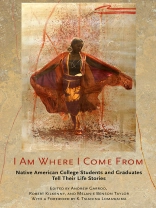‘The organizing principle for this anthology is the common Native American heritage of its authors; and yet that thread proves to be the most tenuous of all, as the experience of indigeneity differs radically for each of them. While many experience a centripetal pull toward a cohesive Indian experience, the indications throughout these essays lean toward a richer, more illustrative panorama of difference. What tends to bind them together are not cultural practices or spiritual attitudes per se, but rather circumstances that have no exclusive province in Indian country: that is, first and foremost, poverty, and its attendant symptoms of violence, substance abuse, and both physical and mental illness…. Education plays a critical role in such lives: many of the authors recall adoring school as young people, as it constituted a place of escape and a rare opportunity to thrive…. While many of the writers do return to their tribal communities after graduation, ideas about ‘home’ become more malleable and complicated.’—from the Introduction I Am Where I Come From presents the autobiographies of thirteen Native American undergraduates and graduates of Dartmouth College, ten of them current and recent students. Twenty years ago, Cornell University Press published First Person, First Peoples: Native American College Graduates Tell Their Life Stories, also about the experiences of Native American students at Dartmouth College. I Am Where I Come From addresses similar themes and experiences, but it is very much a new book for a new generation of college students.Three of the essays from the earlier book are gathered into a section titled ‘Continuing Education, ‘ each followed by a shorter reflection from the author on his or her experience since writing the original essay. All three have changed jobs multiple times, returned to school for advanced degrees, started and increased their families, and, along the way, continuously revised and refined what it means to be Indian.The autobiographies contained in I Am Where I Come From explore issues of native identity, adjustment to the college environment, cultural and familial influences, and academic and career aspirations. The memoirs are notable for their eloquence and bravery.
Зміст
Introduction by Melanie Benson Taylor Part I. Broken: Racial Mixture and Cultural Hybridity1. Seeking to Be Whole, Shannon Prince2. Bringing Back a Piece of the Sky, Blythe George3. Chahta hattak sia, ‘I am a Choctaw Man, ‘ Preston Wells Part II. An Indian Education: Leaving and Finding Home at Dartmouth College4. Nihalgai Bahane’: A Fourth World Story, Jerry Watchman5. Bracelets Upon My Soul, Ma’Ko’Quah Jones6. My Journey to Healing, Kalina Newmark Part III. Full Circle: Returning and Remaking Home7. Little Woman from Lame Deer, Cinnamon Spear8. Village Girl, Alex Anna Salmon9. Future Ancestor, Hillary Abe10. An Unpredictable Journey, John Around Him Part IV. Continuing Education: NADs Reflect on their Journeys11. I Walk in Beauty Davina, Ruth Begaye Two Bears Followup: Shí Asdz Baa Davina, Ruth Begaye Two Bears12. The Good Ol’ Days When Times Were Bad, Bruce Duthu Followup: Living Life in a Posture of Humility, Bruce Duthu13. Why Didn’t You Teach Me?, Bob Bennett Followup: To Be an Indian is a Rough Life, Bob Bennett
Про автора
Andrew Garrod is Professor Emeritus of Education at Dartmouth College. He is coeditor of I Am Where I Come Frome: Native American College Students and Graduates Tell Their Life Stories; Growing Up Muslim: Muslim College Students in America Tell Their Life Stories, First Person, First Peoples: Native American College Graduates Tell Their Life Stories, Balancing Two Worlds: Asian American College Students Tell Their Life Stories, Mi Voz, Mi Vida: Latino College Students Tell Their Life Stories, and Mixed: Multiracial College Students Tell Their Life Stories, all from Cornell. Robert Kilkenny is Executive Director of the Alliance for Inclusion and Prevention. He is coeditor of I Am Where I Come From; Mixed; Mi Voz, Mi Vida; and Balancing Two Worlds, all from Cornell. Melanie Benson Taylor is Associate Professor and Chair of Native American studies at Dartmouth College. She is the author of Disturbing Calculations: The Economics of Identity in Postcolonial Southern Literature, 1912–2002 and Reconstructing the Native South: American Indian Literature and the Lost Cause. K. Tsianina Lomawaima is Professor of American Indian Studies at the University of Arizona. She is the author of They Called It Prairie Light: The Story of the Chilocco Indian School, coauthor of To Remain an Indian: Lessons in Democracy from a Century of Native American Education, and coeditor of Away from Home: American Indian Boarding School Experiences, 1879–2000.












